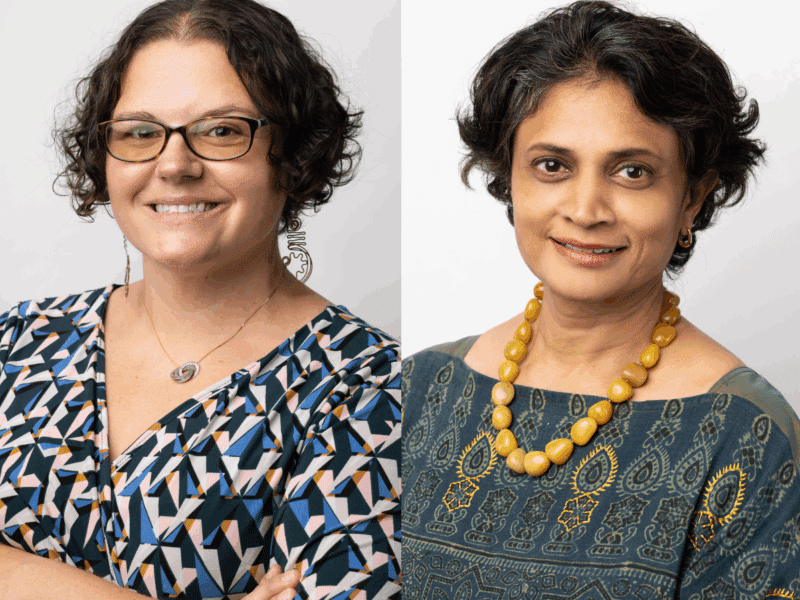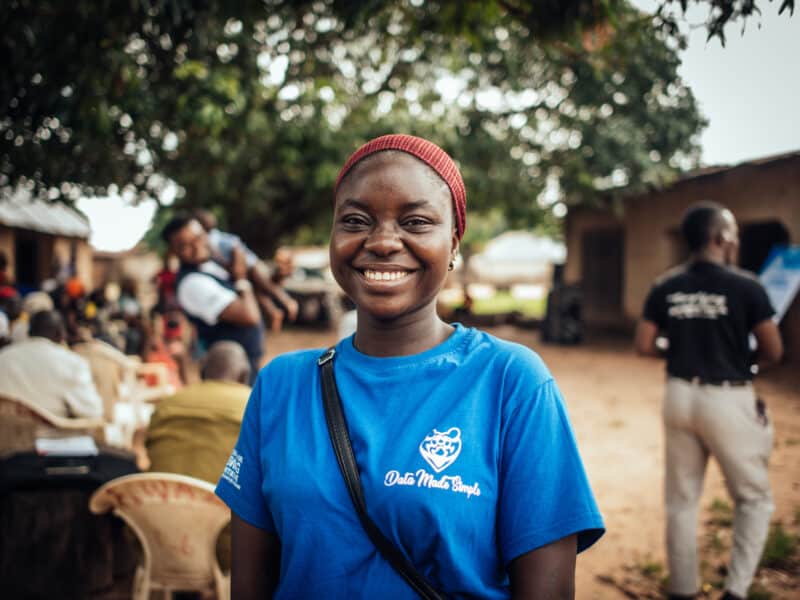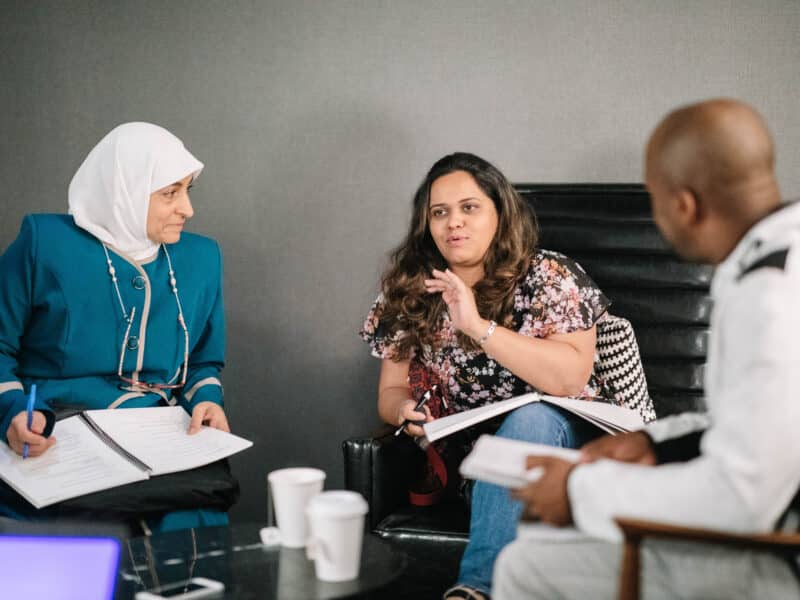This month, the Johns Hopkins Center for Communication Programs celebrated its 30th year as a center. Here, CCP staff members – from one of its earliest employees to one of its newer ones – share some of their memories of working at the leader in social and behavior change. These are just some of the people who ensure CCP is able to inspire healthy behaviors worldwide, just has it has for three decades.
“Change, of course, has been a big part of the CCP journey.”
Susan Krenn, Executive Director
My plan was to stay at CCP for a year. Without recognizing it at the time I started, CCP’s mission dovetailed with just about everything I aspired to do: International in scope, a focus on reproductive health and using “information, education and communication” as it was known at the time to empower those with less opportunity. From day one, I was given – and took – the opportunity to learn and grow. With 33 years behind me and counting, I don’t remember all of the details of the programs I’ve worked on. But I do remember the amazing people I’ve had the fortune of working with over the years, both in the field and on the CCP team. I’ve been challenged, mentored and inspired by so many.
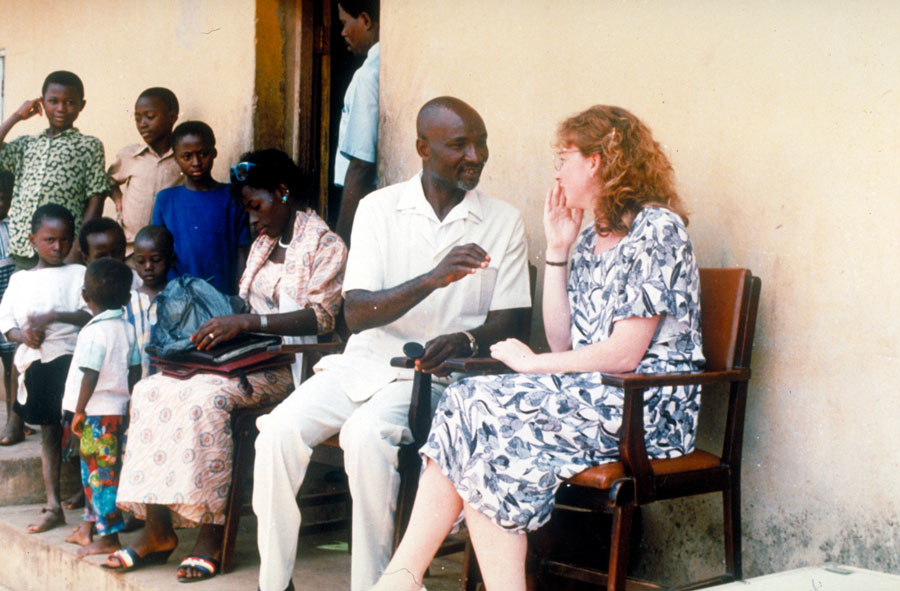
From 1990, Susan Krenn joins the production crew on the set of “Eni A Wi Fun” (“To Be Forwarned”), a video about the importance of family planning.
Change, of course, has been a big part of the CCP journey, in our technical programs and the way we get the work done. I wrote my first CCP proposal for USAID Ghana (in pencil on paper) in the mid-1980s and went to living in Lagos, Nigeria (with my husband and six-month-old) in the early 1990s before the time of cell phones. Today, we instantly capture, transmit and connect with others – virtually everywhere. These advances allow us to be more engaged, more efficient, more responsive and more versatile in everything we do. What hasn’t ever changed is the passion, drive and love of the work the CCP team brings to our mission of using the power of communication to improve and save lives.
I never imagined I’d still be at CCP as it turns 30, but am incredibly grateful for being part of this amazing journey.
“CCP connects us with something larger that our own egos!”
Ben Lozare, Founder, Leadership in Strategic Communication Workshop
A favorite joke I make at the end of our workshops is to confess to two errors I made in what I have taught. Seeing the disappointed looks in our workshop participants’ faces, I say in a serious tone: “First, half of what I have taught you is not true.” I always see even more disappointed looks. Then I say with a smile, “And, second, I don’t know which half it is.”
The truth is, I am serious every time I make this joke! We have had “returnees,” people who come to our workshop for the second time after a decade or so. They all say the course has changed so much and are thankful that they have “returned.” We also have had “second generation” participants! The daughter of one of our Nigerian participants in the 1990s showed up last year and said, “My mother attended this workshop more than 20 years ago and insisted that I take it too!” Her mother says that the course had changed radically.
I see this as one of the joys in working at CCP! Nothing is permanent. Every project provides us with key lessons and valuable insights, which find their way in our teaching, both at the university and in our training programs. We grow continuously, challenging conventional wisdom and knowledge, and in the process make valuable contributions to the strategic use of communication in public health.
And the most satisfying of all, we do so just by being ourselves, by letting our own lives speak. CCP made up of a collection of people who deeply care about the world and who are humble enough to know that the real challenge is not to transform the world, but simply to contribute in the best way that we can.
“CCP is CCP because of the incredible people who work here.”
Uttara Bharath-Kumar, Senior SBC and Capacity Strengthening Advisor
CCP is CCP because of the incredible people who work here. Perhaps the story that best encapsulates CCP’s spirit for me is from the 5th Entertainment Education conference in New Delhi in 2011.
My colleague Sanjanthi Velu, the India team and I were swimming in a sea of logistics, challenges and overwhelming work leading up to the conference. We were in despair and wondering if we could even pull of this enormous undertaking. Then, the CCP team came to town.
The international event suddenly felt more manageable. Whether they were from Baltimore HQ or our field offices, senior staff or junior, they just asked “where do you need help” and pitched in as one. With complete trust, we could delegate tasks and focus. That feeling of always knowing you have a family of colleagues who stand solidly behind all the work you do, with integrity and genuine desire to make a difference for the better, without just looking for credit, is what keeps most of us working here for years and years.
Congrats CCP. Proud to be part of the team since 1997.
“We’re a global family full of people with purpose and passion.”
Jennifer Orkis, Senior Program Officer
I started at CCP in 2005 as a wide-eyed intern in Zambia during my Master of Health Science practicum. What was meant to be a three-month fellowship turned into six … and then became 13 years. Multiple countries, a huge array of health topics and several smashing social and behavior change campaigns later, I’m as jazzed about being a CCP’er as I was when I first started. We’re a global family full of people with purpose and passion, working hand-in-hand with households, communities and entire countries to co-create strategic communication programs that move the needle on some of the world’s biggest health challenges.
CCP keeps my mind abuzz, my heart full and my creative juices flowing. We do what’s right, we do it at scale and we do it with impact. Thanks for letting me be part of 13 of your 30 years, CCP. Happy birthday!
“One of the bravest things I have ever seen firsthand happened while I was working at CCP.”
Marla Shaivitz, Director, Digital Strategy
One of the bravest things I have ever seen firsthand happened while I was working at CCP.
It was the fall of 2014, when the U.S. response to Ebola was taking shape. Earlier that summer, Kathryn Bertram of CCP wrote a blog post on her experience in leading an unrelated workshop in Sierra Leone, as the country nervously watched the Ebola outbreak in neighboring Guinea. She was among the early voices writing about social and behavior change communication as an approach to stemming the spread of the virus.
As we know, the virus did spread from Guinea into Liberia and Sierra Leone. It was a tense time. In the middle of an urgent planning meeting I attended at USAID about the response, Kathryn and another co-worker Anna Helland both offered to travel there.
Immediately.
I’ve worked in public health for close to 15 years (and in other sectors before that), and I have never seen anyone volunteer for an assignment that had such personal risk, with so many unknowns attached. Ebola was spreading quickly and there is no cure.
Anna traveled first to Liberia, eventually moving her husband and children to Liberia for two years as CCP’s country director. Kathryn went to Liberia as well then to Sierra Leone on numerous occasions. Their efforts were part of a larger CCP-wide response with other staff moving to live and work long-term in Ebola-effected countries. To this day, I am still struck by how willing Anna and Kathryn were to volunteer, without fanfare, that Monday afternoon in Sept. 2014.
“… I couldn’t have been more wrong. These women were on it.”
Amanda Berman, Monitoring Officer
Not too long ago, I went to a health facility in Zomba, Malawi, about an hour outside of One Community’s program headquarters in Blantyre. We needed to pre-test an app we built that would help us keep track of the knowledge, attitudes and behaviors related to HIV risk and vulnerability over time for members of our Go! Girls clubs.
A big part of the program is a focus on adolescent girls and young women, especially those most vulnerable (e.g., out of school or pregnant). We went to meet up with a few supervisory health workers, the young ladies supervising Go! Girls club sessions and administering questionnaires to group participants. Not much older than the participants themselves, these health workers needed to feel comfortable using their tablets to navigate the app while also ensuring confidentiality and sensitivity when interacting with the girls.
I didn’t think it would be hard for the workers to get used to the app, but I thought it may take some time. I couldn’t have been more wrong. Upon arrival, they laughed, downloaded the app with the code I provided and started practicing with each other. I anticipated a long day of trial and error and troubleshooting, and again, I couldn’t have been more wrong. These women were on it.
I felt so relieved that the past few years of pushing the use of mobile devices for data collection and monitoring seemed to be paying off. Not only was it helping us to collect real-time data, but it was also making it easier for health workers to enter data and maintain high-quality data. One of my favorite moments was when one of the ladies answered her own smartphone while continuing to practice and comment to us on the side. Using the mobile app was so natural and comfortable, she was able to juggle a few devices and talk to us at the same time. She told us not to worry, during real data collection she would never answer her phone and we all laughed together.
“The smackdown reflects what I love about working at CCP.”
Tara Sullivan, Director, Knowledge Management
One of my favorite memories of CCP (which also encapsulates what I love about CCP) was the KM vs. SBCC smackdown that took place in February 2015. We had two teams the Knowledge Ninjas and the SBCC Superheroes. The event was WWE smackdown meets nerdy debate club.
What I loved about it is also what makes me love CCP:
The event had THEORETICAL basis and programmatic implications. We debated a topic important to CCP from a strategic/positioning perspective, but also a topic of interest among staff. How do Knowledge Management and Social and Behavior Change Communication relate to each other? What are the key aspects of each? How do they complement each other?
- It was COMPETITIVE. We split into teams and created debate questions and prepared answers. That said, it was friendly competition with good natured jabbing and jeering.
- It was FUN. Each team dressed up per the theme of their team (knowledge ninjas in all black with swords, and superheroes in capes/tutus, etc.) Each team fully embraced their roles.
- It involved TEAMWORK and also brought staff together for a shared fun event.
- We all LEARNED about each discipline but in a fun way.
So, in a nutshell, the smackdown reflects what I love about working at CCP. People are fun, motivated, smart, challenge your ideas and push you go further faster – with the end goal of doing better work and saving lives. An event like this only works where you feel like your colleagues are family, you trust each other and share the same passion for the work.


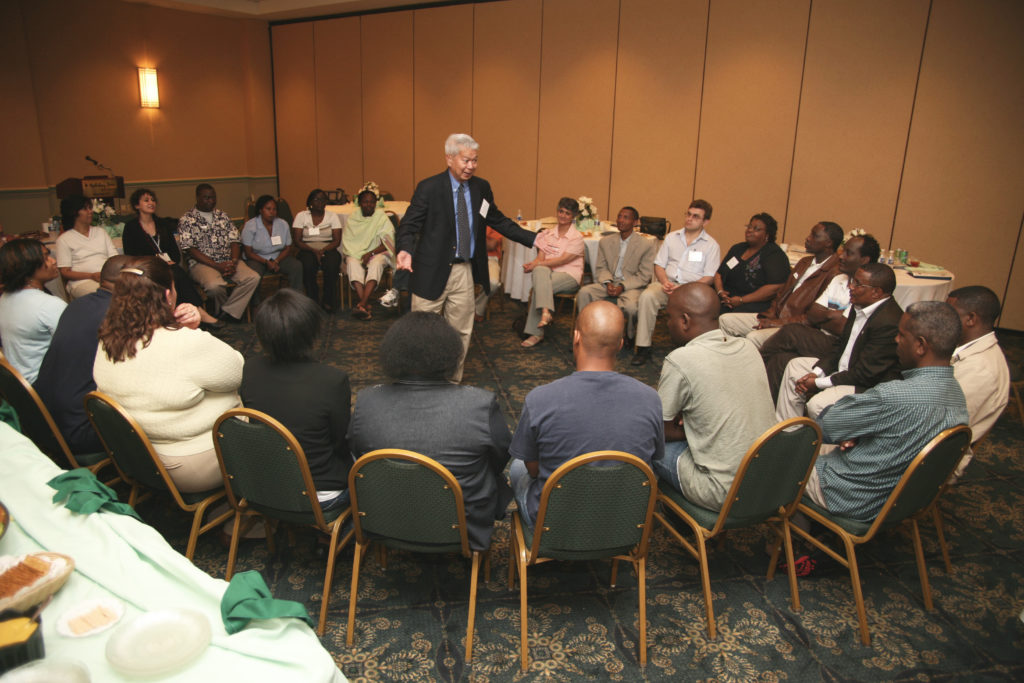
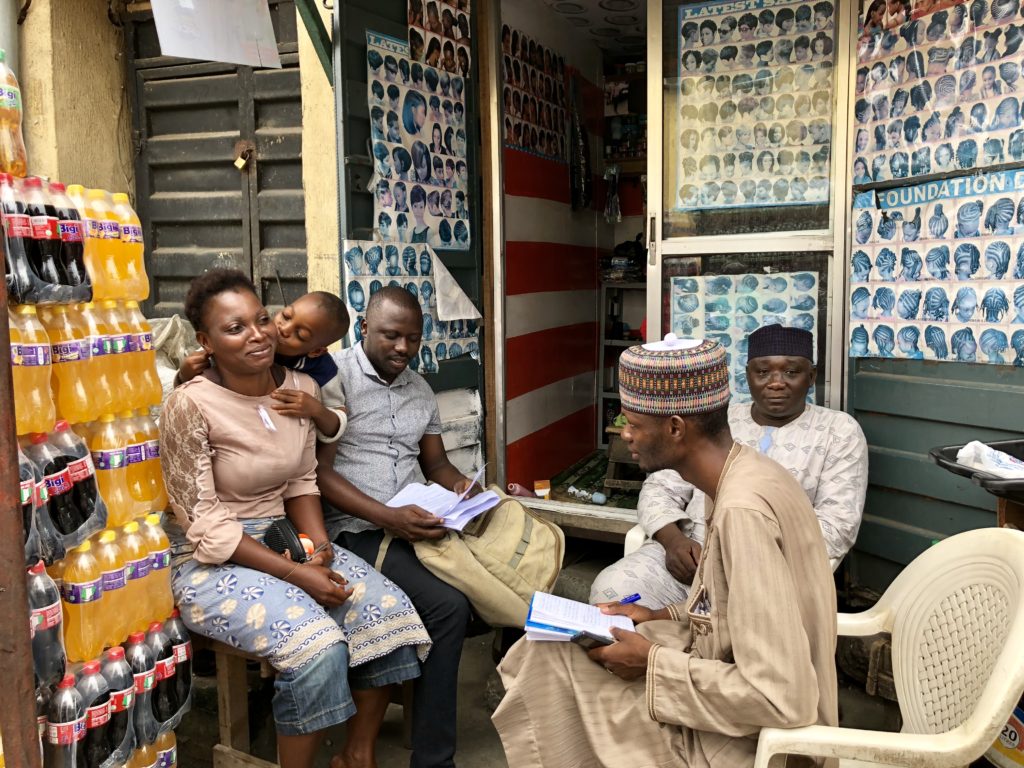
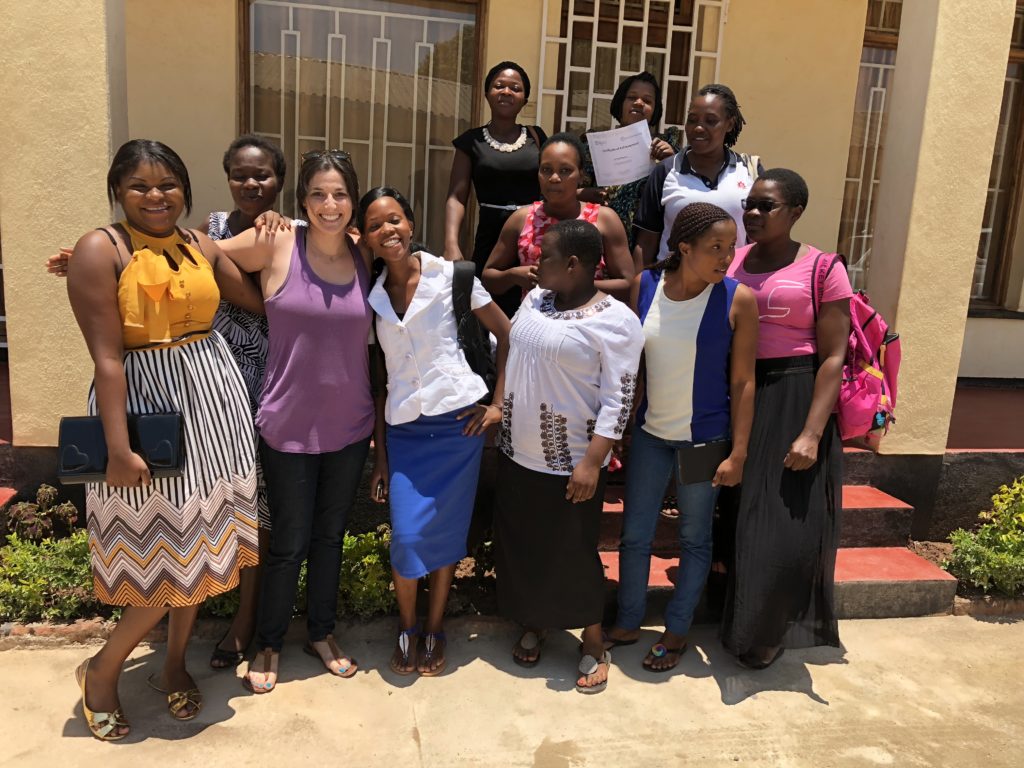
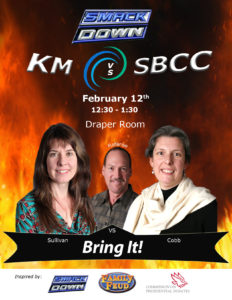 The event had THEORETICAL basis and programmatic implications. We debated a topic important to CCP from a strategic/positioning perspective, but also a topic of interest among staff. How do Knowledge Management and Social and Behavior Change Communication relate to each other? What are the key aspects of each? How do they complement each other?
The event had THEORETICAL basis and programmatic implications. We debated a topic important to CCP from a strategic/positioning perspective, but also a topic of interest among staff. How do Knowledge Management and Social and Behavior Change Communication relate to each other? What are the key aspects of each? How do they complement each other?